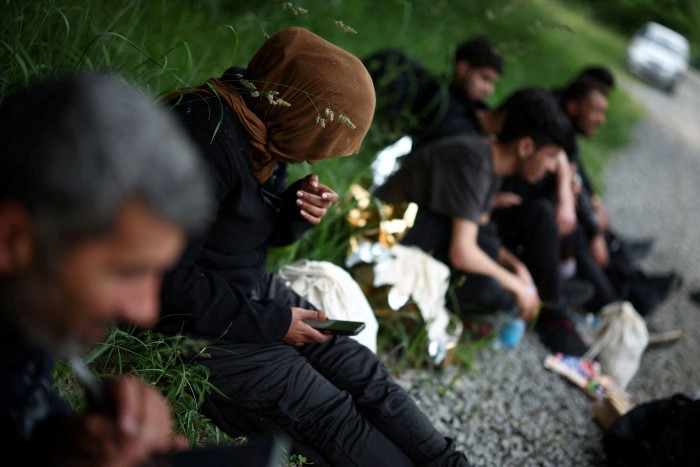
Unlock the Editor’s Digest for free
Roula Khalaf, Editor of the FT, selects her favourite stories in this weekly newsletter.
Donald Tusk has thrown European migration policy into turmoil with a surprise decision to suspend the right to asylum in Poland, days ahead of an EU leaders’ summit where the matter is set to dominate.
The Polish prime minister was the latest EU leader to announce unilateral curbs on migration, after Chancellor Olaf Scholz earlier this month introduced checks at all German border controls in a move France has since said it wants to replicate.
Warsaw’s decision risks further damaging a fragile consensus on migration and asylum policy among the bloc’s 27 member states that is already being challenged by resurgent far-right parties across the continent.
On Monday evening, European Commission president Ursula von der Leyen wrote to EU leaders laying out what she said were “European solutions for a European challenge” of tackling increased irregular migration.
Tusk, who served as European Council president before returning to power in Poland, said over the weekend that Warsaw would temporarily put on hold the right to seek asylum for people crossing the border from Belarus. He argued that the measure was aimed at stopping Minsk and its ally Russia attempting to destabilise Poland.
“Our right and our duty is to protect the Polish and European border,” Tusk said on social media platform X on Monday. “Its security will not be subject to negotiation — with anyone.”
Italy’s rightwing Prime Minister Giorgia Meloni, who has long opposed irregular migration into the bloc, invited a select group of like-minded leaders including Tusk and Scholz to hold a preparatory meeting in Brussels on Thursday ahead of the summit, according to three people familiar with the proposal. Their goal was to agree a joint position on a tougher approach to migration, the people said.

Pressure has been increasing on Brussels to give a green light to what some capitals have euphemistically termed “innovative solutions” allowing them to restrict migration.
These include setting up “hubs” outside the bloc for asylum seekers, modelled on Italy’s agreement with EU candidate Albania, where such centres are due to become operational this week. Capitals are also seeking to increase the number of migrants being turned away at the bloc’s external borders and stepping up work on returning them to their countries of origin.
In her letter to leaders, von der Leyen said Brussels would advance work on these demands, as well as speed up the implementation of new EU asylum rules.
“We should also continue to explore possible ways forward as regards the idea of developing return hubs outside the EU,” she wrote, adding that Brussels would “draw lessons” from the Italy-Albania arrangement.
“I recall when some diplomats began talking about ‘innovative solutions’ 18 months ago and some of us fell off our chairs in shock,” said one senior EU diplomat involved in the pre-summit negotiations. “But now this kind of rhetoric is becoming almost mainstream.”
Former Swedish prime minister Carl Bildt told the Financial Times that Europe’s border-free Schengen area was now “on a slippery slope” given the expansion of frontier checks, which “makes it easy for populists to demand we take another step”.
Each country was also having its own slightly different debate, said Bildt who is now co-chair of the European Council on Foreign Relations. In Sweden, for instance, “the numbers [of migrants entering] are going down, but the politics are going up”, he said.
While Tusk is joining a growing majority of EU leaders opposed to illegal migration, his move has stoked further tensions at home within his ruling coalition. On Monday two of his junior partners distanced themselves from Tusk’s plan, insisting the prime minister had not consulted them before making the announcement.
“The right to asylum is ‘sacred’ in international law and results from conventions ratified by the Republic of Poland,” said Szymon Hołownia, leader of the Poland 2050 party. He said “such severe restrictions” could not be used as preventive measures and would require parliamentary approval before becoming law.
“I consistently stand by the position that [border] safety is absolutely paramount, but safety does not exclude humanity,” Hołownia said.
Additional reporting by Andy Bounds in The Hague